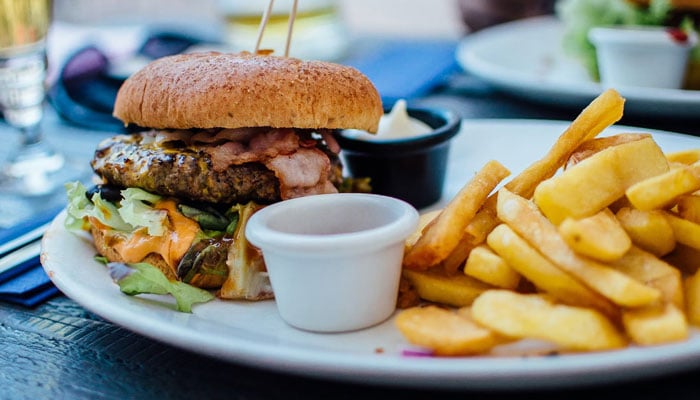‘Pakistan 2nd highest consumer of industrial trans fatty acids’
Islamabad:Dr Tahira Siddiqui, Deputy Director, Islamabad Food Regulatory Authority, said that Pakistan is the second highest consumer of industrial trans fatty acids (iTFAs) in the world as after petroleum products, our edible oil imports were the largest worth $4.3 billion.
Dr Tahira was addressing a symposium on “Reducing iTFAs in Pakistan” jointly organised by Sustainable Development Policy Institute (SDPI) and Cargill Pakistan here Tuesday.
Stressing the need to ensure dialogue between industry and technical experts to shift from iTFAs, Dr Tahira said that alternatives to iTFAs needs to be given to the industry pertaining to their raw material sources and practices. Moreover, incentives can also be used to promote shift and embrace alternatives to iTFAs, she said adding that it is a complex challenge to eradicate iTFA. However, she said we can help achieve the task by adopting efficient policies, and multifaceted approaches to engage all the partners.
Sarim Bokhari from Cargill Pakistan, said that the developing countries like Pakistan lacks legislation that is not compliant with WHO recommendations, therefore Cargill is collaborating with the SDPI in this regard.
Dr Abid Qaiyum Suleri, Executive Director, SDPI, said that multisectoral dialogues are required for managing dynamic issues like injurious impact of iTFAs on health. He proposed a strategy starting from an honest and credible disclosure from the industry about the cooking oil products that will lead to innovation and alternatives to counter iTFAs proliferation.
Ayaz Ahmed Soomroo from Pakistan Standards & Quality Control Authority (PSQCA) said that after harmonisation of iTFAs’ standards PSQCA is regulating it at the Federal level. The National Committee on Food Standards that convene food authorities of all the provinces along with PSQCA has harmonised PSQCA standards, he said adding that a regulatory scheme for iTFAs was underway and it will help resolve the problem.
Dr Khawaja Masood Tahir, National Coordinator, Ministry of Health said that since the harmonisation of food standards was made after the Council of Common Interests in 2019, the national standards were revised and TFAs were made permissible to 5% of the total product. He called for constituting a single committee to approve the rules for the left-over food items containing iTFAs. Dr Tahir mentioned that enforcement and implementation is the major challenge and the capacity of implementing agencies on iTFAs was the biggest hurdle in phasing out iTFAs.
Farah Ather, Deputy Director, Regulation and Accreditation, Punjab Food Authority (PFA), said the iTFAs’ standards were harmonised and adopted by the PFA whereas the Vanaspati standards were not adopted so far. The WHO regulations are not only a legal but also a moral obligation to make a society healthy, she said.
Huzaifa from KK Foods said his firm was manufacturing snacks, nimkos, and sweets whereas the iTFAs reduction was a challenge during the production procedures. We want guidelines for oil usage and would welcome all such interventions to save public lives by switching over benign options, he added. Ghulam Hussain from RnD Punjab Oil said the iTFAs reduction is possible through full hydrogenation and blending of palm oil.
Dr Zafar, Food safety expert at FAO, said most of our food is street food that is unregulated. Since the TFAs are drivers of many serious diseases, street food should be considered by food authorities to regulate it. Dr Muhammad Ajmal, Vice-President, Pakistan Medical Association (PMA) stressed the need to enhance awareness among the general public to reduce the use of iTFAs.
Dr Fauzia Sadiq from Shifa Tamer e Millat Foundation said the challenge is how to bring shift in the public behaviour for switching from existing consumption patterns.
-
 Dua Lipa Wishes Her 'always And Forever' Callum Turner Happy Birthday
Dua Lipa Wishes Her 'always And Forever' Callum Turner Happy Birthday -
 Police Dressed As Money Heist, Captain America Raid Mobile Theft At Carnival
Police Dressed As Money Heist, Captain America Raid Mobile Theft At Carnival -
 Winter Olympics 2026: Top Contenders Poised To Win Gold In Women’s Figure Skating
Winter Olympics 2026: Top Contenders Poised To Win Gold In Women’s Figure Skating -
 Inside The Moment King Charles Put Prince William In His Place For Speaking Against Andrew
Inside The Moment King Charles Put Prince William In His Place For Speaking Against Andrew -
 Will AI Take Your Job After Graduation? Here’s What Research Really Says
Will AI Take Your Job After Graduation? Here’s What Research Really Says -
 California Cop Accused Of Using Bogus 911 Calls To Reach Ex-partner
California Cop Accused Of Using Bogus 911 Calls To Reach Ex-partner -
 AI Film School Trains Hollywood's Next Generation Of Filmmakers
AI Film School Trains Hollywood's Next Generation Of Filmmakers -
 Royal Expert Claims Meghan Markle Is 'running Out Of Friends'
Royal Expert Claims Meghan Markle Is 'running Out Of Friends' -
 Bruno Mars' Valentine's Day Surprise Labelled 'classy Promo Move'
Bruno Mars' Valentine's Day Surprise Labelled 'classy Promo Move' -
 Ed Sheeran Shares His Trick Of Turning Bad Memories Into Happy Ones
Ed Sheeran Shares His Trick Of Turning Bad Memories Into Happy Ones -
 Teyana Taylor Reflects On Her Friendship With Julia Roberts
Teyana Taylor Reflects On Her Friendship With Julia Roberts -
 Bright Green Comet C/2024 E1 Nears Closest Approach Before Leaving Solar System
Bright Green Comet C/2024 E1 Nears Closest Approach Before Leaving Solar System -
 Meghan Markle Warns Prince Harry As Royal Family Lands In 'biggest Crises' Since Death Of Princess Diana
Meghan Markle Warns Prince Harry As Royal Family Lands In 'biggest Crises' Since Death Of Princess Diana -
 Elon Musk Weighs Parenthood Against AI Boom, Sparking Public Debate
Elon Musk Weighs Parenthood Against AI Boom, Sparking Public Debate -
 'Elderly' Nanny Arrested By ICE Outside Employer's Home, Freed After Judge's Order
'Elderly' Nanny Arrested By ICE Outside Employer's Home, Freed After Judge's Order -
 Keke Palmer On Managing Growing Career With 2-year-old Son: 'It's A Lot'
Keke Palmer On Managing Growing Career With 2-year-old Son: 'It's A Lot'




